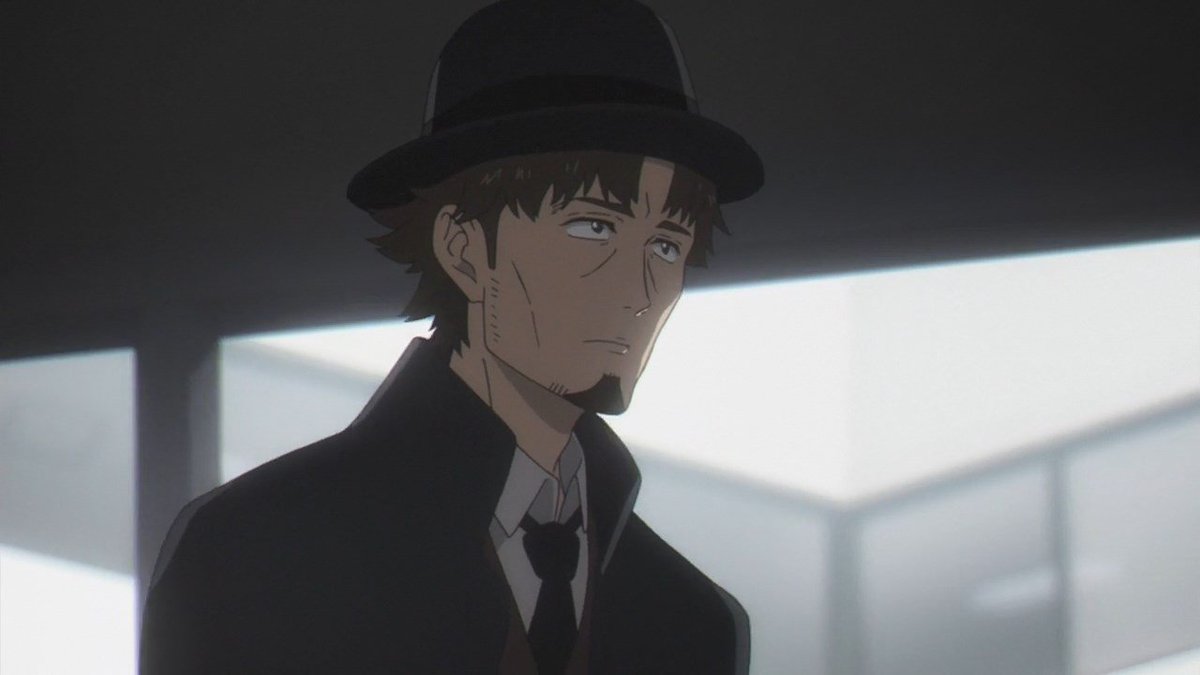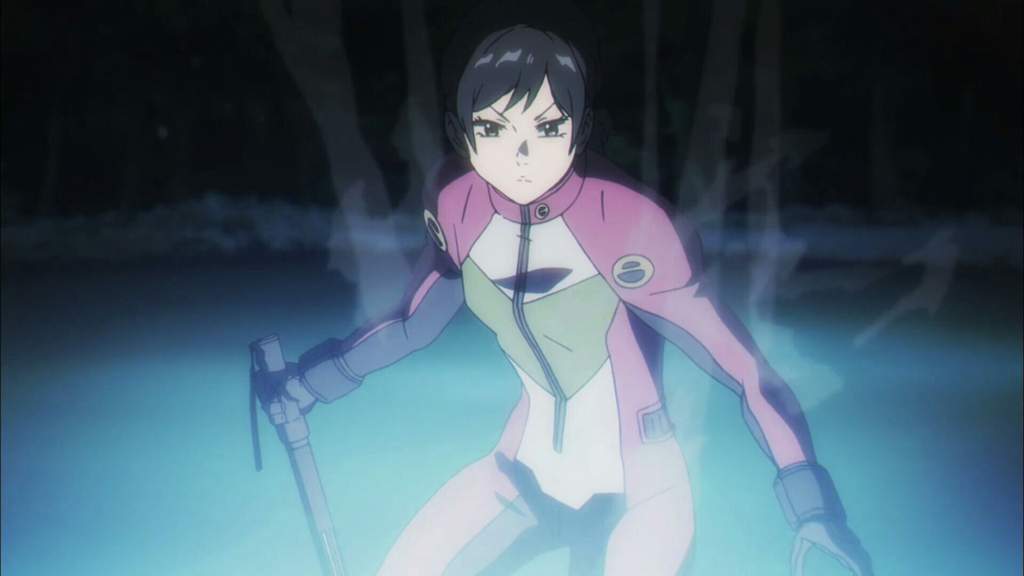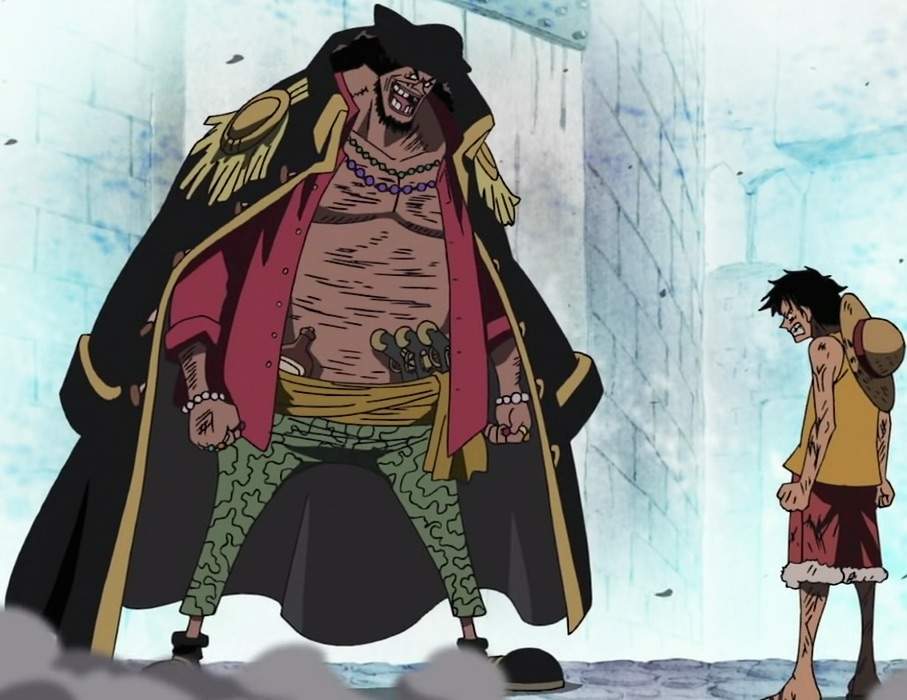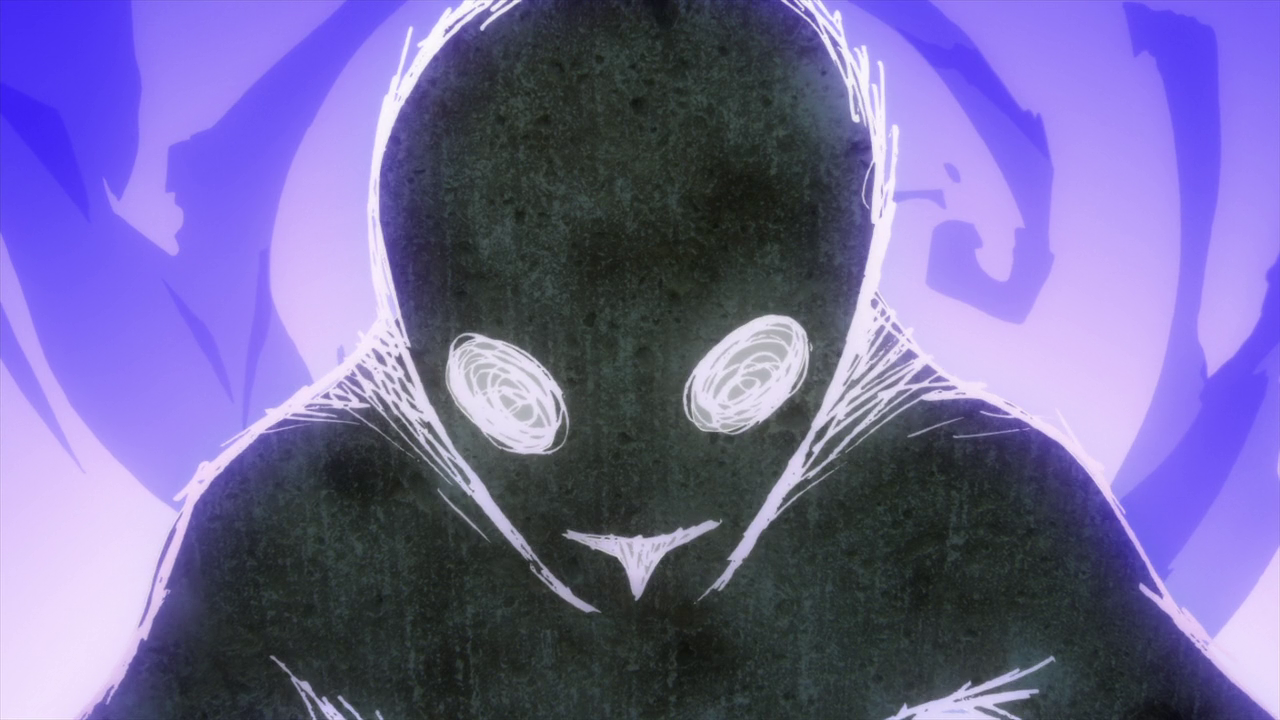So what happened this week? Well, Boogiepop happened, that's what.
 |
| Screw you, you smug bastard! |
Obviously, combined with the 6 other shows in the roundup, 5 episodes of Boogiepop are way too much content to cover in a single post. And thus, we have a special edition of the weekly roundup today: covering the 5 new episodes on an episode by episode basis. The Boogiepop at Dawn episodes won't have as much detail as a typical entry on the roundup, since there isn't space for speculation when I have no time to rest between episodes. Each episode's section was written immediately after I watched it before watching the next one in order to give an honest reaction without the benefit of knowing what happens next. Oh, and due to the extraordinary circumstances surrounding this post, Boogiepop is hereby immune from elimination on this week's roundup. And there will be no special joke titles this week because I'm not creative enough to come up with 5 all at once.
Okay, enough stalling! Let's get on with it!
Episode 9
In episode 9, Asukai plans to use the perfect rose he sees inside Aya's heart to spread his hive mind across the city and, in turn, use the citizens of the city to spread it across the world. The process of doing so would kill Aya, as he needs to completely extract her heart. After Masaki deduces Aya's location thanks to a bit of background noise on his last phone call with Aya, he breaks into the abandoned amusement park to rescue her. He is ambushed and subdued by Asukai's followers, but is rescued by Boogiepop. Boogiepop confronts Asukai, and it is revealed that Aya's inhuman nature and the fact that human hearts naturally change over time as new experiences accumulate prevents Asukai's plan from even being possible in the first place. Boogiepop's revelation that the plan was doomed from the start drives the Imaginator from Asukai's body, and Boogiepop rescues Asukai from a fall that would have killed him as the Imaginator is completely purged and destroyed. Later, Suema stumbles upon Masaki and Aya, and hears Boogiepop's voice in the wind as she is left to ponder what the hell just happened.
This is a good finale to a good arc. The theme of utopia being rejected on a conceptual level because it would create a vacuum that goes against the fundamentally chaotic nature of the universe is a unique take on the concept, and I really appreciated the way that this Imaginator presented that conclusion. Masaki and Boogiepop each had their moments to shine and be badass in this episode, and I'm glad that even though Asukai survived, he wasn't given any slack by the narrative either. Instead of being treated as an innocent victim or a misunderstood visionary or anything dumb like that (which is exactly what a weaker story would do with a well-intentioned antagonist like this), Boogiepop calls him what he is: an idealistic fool. It's not often that someone so blinded by supposedly positive ideas of what the world should be is cast as the villain in a story, but it's always interesting when we get a character like this.
While I'm nowhere near qualified enough to say if this is accurate or not, Asukai's goals remind me a lot of Buddhist ideals. As far as my understanding goes -- which is limited to what I learned while studying world history in college, so please correct me if I'm wrong -- Buddhism argues that life is an endless cycle of suffering, death, and rebirth that can only be escaped by discarding all desires for any material goods or earthly attachments, including our relationships with others. Because these desires hold us back from reaching our natural state of being, called moksha, our continued existence as our souls keep coming back to Earth in new forms is causing us untold pain and suffering. Asukai sees all people's hearts as incomplete, and works to remove desire and fear from those around him in order to create a perfect state of being among the entire human race. Buddhist philosophy has greatly influenced Japanese culture and history, as it has blended with the traditional religion of Shintoism to form its own unique variant (which I am not qualified to explain in the slightest). While I can't say this for certain, I get the felling that this Imaginator storyline was written specifically as a rejection of these Buddhist ideas that would permeate traditionalist Japanese culture, instead arguing that passion and desire is what makes us human and should be embraced instead of rejected. If that is true, then it's definitely a message worth thinking about, though I'm not going to say that either side of the argument is wholly right or wrong, as this is something that seems to be deliberately left open to interpretation.
Episode 10

In episode 10, in a strange place among the stars, Echoes and Boogiepop meet for the first time. When Echoes asks Boogiepop how they got their name, they tell him the story of the Scarecrow Kuroda. Kuroda was a synthetic human created by the Towa Organization who was given a mission: locate any signs of humans developing supernatural abilities and report them to headquarters. During his investigation into a potential mole, he meets and bonds with a young Nagi, who has been hospitalized for having random bouts of extreme pain. Realizing that Nagi is developing abilities of her own, Kuroda breaks into a Towa Organization research facility and steals an experimental drug meant to suppress her burgeoning powers in order to protect her from his superiors. These actions mark him as a traitor, and as he lies bleeding out from an assassin's attack, he meets Touka and tells her his story.
That was awesome! It looks like the story of Boogiepop's origins is being explored in this arc, which is great on its own, but the fact that we got some details about the mysterious Towa Organization on top of that is a huge bonus. Based on Kuroda's dialogue with his partner Pigeon, it seems that the group got a tip from the future that humans are on an accelerated path of evolution, and the resulting conflict threatens to have apocalyptic consequences. And, rather than trying to prevent this, the Towa Organization's response seems to be to make sure that they are the ones that will win this conflict, and so they begin their research into synthetic humans and supernatural abilities. There's not a whole lot more to say about this episode, as it is a solid standalone story, save that it has the best animation of the series so far, and considering this is Madhouse we're talking about here, that's saying something.
Episode 11
 |
| Hey, me too! |
In episode 11, Dr Kisugi, the psychiatrist who was treating Nagi, had witnessed Kuroda give Nagi the drug before he was attacked by the assassin, and managed to obtain a sample of the drug. After experimenting with it, she determines that the drug accelerates evolution and gives the user incredible regenerative abilities. Using this drug to augment herself, she decides to pursue her incredible fascination with fear and becomes a serial killer, torturing her victims and eating their brains after they've become well and truly terrified. As her exploits start getting too much national attention, though, she decides to lay low and just terrorize the patients in her hospital for now. Later, Touka is brought in to Kisugi for treatment, as her mother fears the presence of another personality inside her, and Kisugi has a philosophical discussion with Boogiepop.
This arc is selling itself as an origin story for Boogiepop, but strangely enough the actual nature of Boogiepop's existence and the way they appeared in Touka's body is left unexplained. I suppose, then, that the purpose of this arc is to show how Boogiepop and Nagi met, since they are established allies in the present timeline, and to give more depth to the Towa Organization and their research. More importantly, though, how about Kisugi? Her character was terrifyingly insane while still being competent, and the idea of a coward becoming obsessed with fear to the point that she would inflict it on others is one that I haven't seen before. I'm really enjoying this story arc at time of writing, so here's hoping the last two episodes live up to this level of quality.
Episode 12
 |
| Oh, no, not this crap again! |
In episode 12, Nagi's father Seiichi was a novelist when he was alive, and his books tended to speak to troubled youth who developed extraordinary abilities. When fans of his books start dying in large numbers, Seiichi tries to investigate the cause. He learns that the victims are being killed because of their abilities, which makes him a target for the Towa Organization's assassin Sasaki. A few years later, Sasaki is ordered to hunt down the mysterious serial killer eating young girls' brains (who we the audience know is Kisugi). Sasaki bumps into Nagi during his investigation, and the two of them decide to investigate the case together. Kisugi observes their investigation and decides she wants Nagi to be her next victim, so she leaves a clue about her identity with a friend of her victim. Nagi picks up on the clue and deduces that Kisugi is the killer, and thus leaves Sasaki behind and goes to confront Kisugi herself, unaware that she is walking right into a trap.
Okay, the first half of this episode was kind of boring. Seiichi isn't a bad character at all, but too much time was dedicated to him discussing this episode's philosophical tangent, and the discussion he had with the little girl about the nature of death and evolution doesn't really cover anything that we haven't seen discussed in previous episodes, so I just found myself wishing desperately for the scene to just move on already. Once it did, though, things picked up dramatically, and the Sasaki/Nagi buddy cop story was quite entertaining. I especially liked seeing Nagi put Sasaki on the spot and tell him to go "pick up" a high school girl for their investigation. Seeing a professional killer all flustered over something so mundane was kinda hilarious.
Episode 13

Finally, in episode 13, Sasaki secretly follows Nagi to the hospital where she plans to confront Kisugi. However, Kisugi moves against Sasaki first, having secretly made an alliance with Pigeon, who wants revenge against Sasaki for killing Kuroda. Sasaki manages to kill Pigeon, but Kisugi takes advantage of his distraction and murders him, revealing that she left incriminating evidence of her crimes in his apartment, thus framing him for the murders, before staging his suicide. Kisugi then attacks Nagi, and though she seems to have the upper hand at first, Nagi successfully lures her away from the hospital and into a trap where she manages to mortally wound Kisugi. As Kisugi attempts to escape, Boogiepop appears and kills her, naming her the Fear Ghoul. When Nagi tells Boogiepop she plans to continue fighting to protect others, Boogiepop tells her that they will meet again if that is the case and gives her their name, which they adopted based on Kuroda's last words. Back in the present, having finished telling their story, Boogiepop and Echoes part ways.
This may not be an action heavy show, but whenever a fight does happen, Madhouse shows you why they are among the kings of action animation. Every one of Kisugi's movements was so well done that I ended up missing some dialogue at one point because I was just so impressed with the animation! Since this episode was almost entirely framed around that battle though, there isn't much to really say about it other than how cool it was and how well it tied up the loose ends of this story arc. I'm not sure why Madhouse decided to structure its release like this, when it dropped all four episodes of this arc on the same day, but it means that watching it felt more like watching a film than the one episode per week experience from the Imaginator arc. What I do know, however, is that I got to see Nagi as a starring character in a story arc from start to finish for once, which is great because she is the best character and she tends to stick in the background. I always got the feeling whenever I saw her that she was a character who had already had her arc offscreen, so getting to see her grow from a scared little girl with no purpose who is only pretending to be fearless to an actual super-competent badass hero was quite satisfying. I also enjoyed all the world building details about the Towa Organization. Based on my research, it seems like we're going back to a weekly release schedule for the last five episodes of the series, so look forward to seeing Boogiepop return to the roundup proper in week 9!























